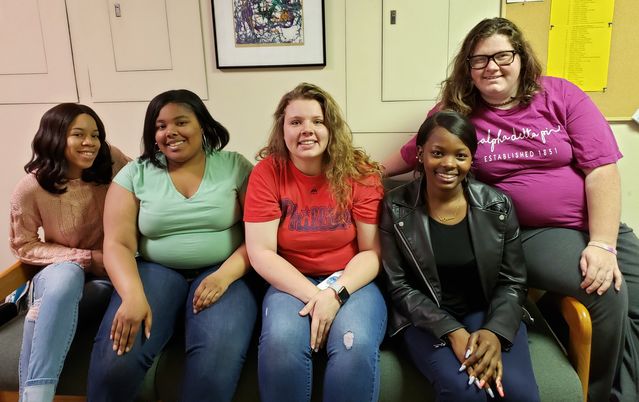Friends
Friends Have More Say in Your Relationships Than You Think
Research shows the many (sometimes hidden) ways friends influence your romances.
Posted June 7, 2019 Reviewed by Devon Frye
This post is the second in a series of three articles written by students in my Spring 2019 Close Relationships course. All three posts focus on how your larger network of friends and family can affect your romantic relationships. This article, by Jahnae Edwards, Jessica Garofalo, Claudina Pierre-Paul, Yasmine Thomas, Jessica Snyder, and Madison Cabulis, examines peer pressure in romantic relationships. Click here to read the first in the series.

We all juggle multiple relationships–siblings, friends, romantic partners. But what happens when we begin to feel pressure from these competing relationships? Many psychologists stress the prominent effect that peer pressure has on our relationships. This pressure can influence who we date and how long we date. The most influential people in our lives can be our friends and family, those whom we trust the most. We often look to them for advice and approval of our relationships. So, it is not surprising that these people can have a big influence on our relationships.
So, What is Peer Pressure?
Many of us, at some time in our lives, have experienced what peer pressure feels like. Whether it is when your friends encouraged you to ask someone out, or even if your family lovingly pushed you to go for a job that was a great opportunity. But what exactly is peer pressure? Peer pressure is when people in your social circle push you to do something or prevent you from doing something, even if that is not exactly what you wanted to do.
For younger adolescents, peer pressure is especially strong. As adolescents first approach dating, they often see potential romantic partners in terms of the amount of social status they can confer. Adolescents' decisions about who to date are very much influenced by what they think their friends will think and whether the partner will be seen as acceptable by their friends.
How is Peer Pressure Applied?
Peers affect us in a variety of ways. It can be as direct as a friend telling you to do something, or as subtle as everyone around you dressing or looking a certain way. This is also true for peers' effect on our romantic relationships.
In one study, researchers found that the factor most related to when adolescents began dating was their actual age, not when they hit puberty. How does this finding reflect peer influences? Generally, interest in sex coincides with puberty, so if adolescents' interest in dating tracked their burgeoning sexuality, they should start dating around puberty, whether they hit puberty early or late for their age. But that's not what happens. Instead, adolescents start dating when most of their peers show an interest in dating. So for early bloomers, that means entering the dating scene later and for late bloomers, it means starting to date before their bodies are sending them the signals that it's time. This suggests that the main reason adolescents start dating is that they see their friends doing it.
Peers can also influence sexual activity. Research has shown that adolescents are more likely to engage in sexual activity if they believe their friends have liberal attitudes toward sex. Teenagers are more likely to have casual sex if they think their peers approve of such activity. College students on spring break vacations are more likely to indicate a desire to "hook-up" if they think that's the norm among their peers.
However, people may not be aware of just how much their peers are influencing them. In a study where adolescent girls were asked about when and why they first became sexually active, most of the girls said peer pressure had nothing to do with their choice. However, when asked to explain in their own words why they chose to participate in sexual activity they described something they could not name influencing their decision. This implies that teenage girls may internalize peer pressure to the point where it is influencing their decisions without them even realizing it.
These influences can be extremely subtle. For example, in one study, participants were asked to rate faces on attractiveness. Without knowing what anyone else had rated, participants were found to be in agreement on what they perceived as attractive when compared with people they were close to who were outside of the study. That is, people tended to agree with their friends about who was the most attractive. These results are significant because they show that those closest to a person may affect who they're most attracted to.
How Much Do Our Friends Influence Relationships?
So, we've seen that our peer group can influence when we start dating or engage in sexual activity, or who we choose to pursue. But our friends' influence on our romantic relationships extends beyond those initial phases.
Researchers have found that even if we are satisfied with our relationships, our romances are greatly affected by our friends' disapproval. One reason this occurs is that our friends are more dispassionate about our romances than we are. They disapprove of our relationships if they perceive us to be less happy than we should be. Also, our friends’ judgments could potentially be more valid than our own because we can be biased by our own thoughts and feelings about our relationship. For example, it is common to be very infatuated with the person you begin dating, making it hard to see that person's negative traits. However, your friend—who is not being blinded by love, like you are—can see these negative aspects of your relationship.
Greater friend support is associated with higher commitment, satisfaction, and investments in relationships. Also, you are less likely to think you would be better off dating someone else if you have greater friend support. Additionally, it has been shown that members of your social network, whether it be family or friends, directly influence your relationships by displaying either positive or negative reactions to them. For example, a friend might act very rude when they are around your partner whom they dislike them because they know they have an influence. All of this research taken together shows that clearly there is a relationship between friend approval and relationship success.
Who Is Likely to Be Influenced by Peer Pressure?
Naturally, not everyone is equally influenced by peer pressure. Some people have an easier time resisting the influences of their friends than others. Individuals who display certain personality characteristics, such as low self-determination and low self-esteem, may be more susceptible to the influence of friends on their relationship. If you think about it, your first real relationship outside of your family is friendship. When exploring other types of relationships (in this case, romantic), it is likely that you would look to your very first friendship for guidance in this unfamiliar territory. Friendships help shape you as a person, if you have friends who are less than genuine with you, you are going to look for someone trustworthy who will be honest with you. Friendship aids adolescents with low self-determination in adjustment. This insinuates a closer bond between friends because of the initial reliance upon this relationship in such a crucial time in development. When a person has low self-determination, it means they are constantly unsure of themselves. Individuals who are like this would fall easily under peer pressure.
Peers are especially influential during adolescence, when we are much more likely to listen to our friends because of the bond we share with them. In a variety of contexts, those with lower self-esteem are more vulnerable to peer pressure. This is also likely to apply to how their friends influence their relationships as well. This could be positive, if your friends really have your best interests at heart and accurately understand your relationship. However, if your dating choices are influenced by how they'll affect your social status, then an over-reliance on peer approval is likely to lead to bad choices.





